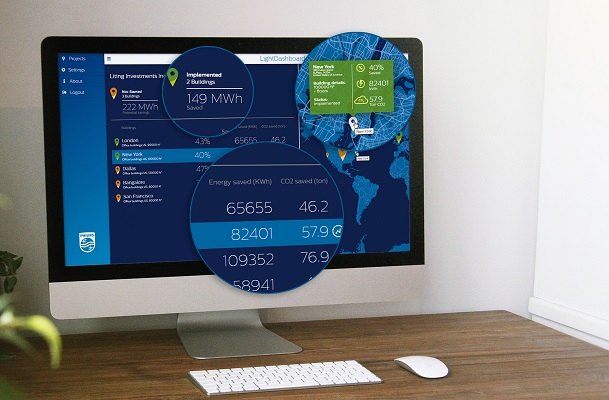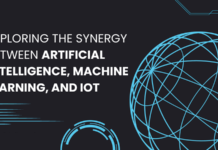Philips Lighting (Euronext Amsterdam ticker: LIGHT), a global leader in lighting, has launched a new wireless connected lighting system aimed at today’s global office lighting systems market worth more than $5 billion1. The Philips InterAct Officesystem enables building managers to reduce energy use by up to 70 percent, optimize operations and create a more comfortable environment without major office renovation. Available first in the US, it targets the 15 billion square feet market for existing offices in North America2. The system, with lamps and luminaires equipped with sensors, is installed and operated by Philips Lighting as a managed service, dispensing with the need for customers to make upfront capital investments.
The network of sensors triggers the system to switch or dim the lights and gathers granular data, such as energy use and room occupancy. This information is displayed on a user-friendly dashboard. If all offices in North America were updated by 2030 with this technology it could save businesses a collective $6.4 billion on energy, equivalent to the output of 36 medium-sized power stations or Co2 emissions of 44 million tons (US).
The wireless Philips InterAct Office complements the company’s existing Power over Ethernet (PoE) connected lighting system. The PoE system is aimed at new build facilities and offices undergoing deep renovation. In contrast, the wireless Philips InterAct Office is designed for retrofitting existing offices which form the vast majority of office lighting projects worldwide.
“Our new system delivers instant energy savings and requires no upfront investment from customers who pay an easy monthly payment funded by the savings,” said Emmanuel Sabonnadiere, CEO of Philips Lighting’s Professional business. “However, energy savings are just the tip of the iceberg. Our ‘Light as a Service’ model frees customers to focus on their business, while information from sensors in the luminaires gives them unique insights into the use of energy and office space to enhance operational efficiencies.”
Unleashing the benefits of connected lighting
With Philips InterAct Office, real estate owners don’t have to rip and replace existing cabling. The system uses wireless gateways that connect the lamps and luminaires. Information acquired by sensors in the luminaires (such as light level, occupancy and energy consumed) is encrypted, then processed and stored securely in the cloud and presented to customers in a simple intuitive dashboard. Being cloud-based and modular, the system is highly scalable and can serve multiple locations worldwide. Benefits to customers include:
- Save: Compared to conventional lighting, energy savings of up to 70 percent when combining LED lamps and luminaires with sensors/controls, by delivering light only when and where it’s needed.
- See: Easy access — anytime, anywhere — to granular data on energy and space usage, providing customers with data-driven insights to optimize their operations. Ability to oversee global operations from a single point and generate reports.
- Scale: Peace of mind – hassle-free program management, installation, commissioning and operation. Secure, future-proof system that is scalable globally. Wide choice of lamps and luminaires including Philips LED tubes, Philips EvoKit and Philips FluxGrid recessed troffers.
The wireless Philips Interact Office system is available now in the US with other markets following later this year.
Forrester on Smart Offices
“Digital transformation leaders – those firms that will outpace their digitally immature competitors – will no longer view buildings merely as places to shelter employees from the elements but will use them to support heightened employee productivity and tools for business growth,” wrote researcher Andrew Hewitt in the February 2017 Forrester report, ‘Breakout Vendors: Workplace Technology Innovation.’








